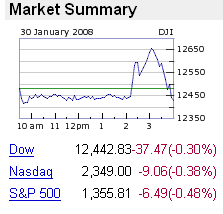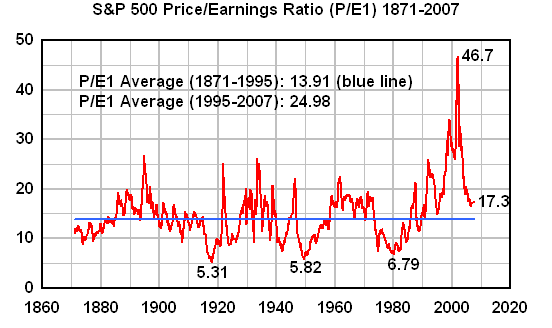
Dynamics

|
Generational Dynamics |
| Forecasting America's Destiny ... and the World's | |
| HOME WEB LOG COUNTRY WIKI COMMENT FORUM DOWNLOADS ABOUT | |
The Fed's super-aggressive rate cutting strategy failed to satisfy investors on Wednesday.
 |
The Dow Industrials had been down around 50 points all day until 2:15 pm, when the Fed announced a new ½% interest rate cut, on top of last week's emergency ¾% interest rate cut. Taken together, this was one of the most aggressive interest rate cuts in the Fed's history.
Fed chairman Ben Bernanke has a long record of believing that the 1930s Great Depression could have been avoided if the Fed had been more aggressive in cutting interest rates, and now we're seeing "Bernanke's historic experiment" in action.
Investors immediately switched from a depressive state to a manic state, pushing the Dow Industrials up almost 250 points.
(I wish to thank the web site reader who informed me that some political pundits are using the phrase, "These are people who think that history always begins this morning." I adapted that phrase in the title of this posting, even though investors could more accurately be described as people "who think that history always begins five minutes ago.")
Alas, shortly after 2 pm, history began again, as Fitch Ratings announced that it would downgrade the rating of the world's fourth largest bond insurer Financial Guaranty Insurance Co. (FGIC). Of the three largest bond insurers, MBIA Inc. and Ambac Financial Group Inc. are also being threatened with a downgrade, while ACA Capital Holdings has already been downgraded. I described this last week in "The collapse of the bond insurers, ACA, Ambac and MBIA." (Also, see "A primer on financial engineering and structured finance," to learn how bond insurers magically transform low-rated securities into AAA rated securities.)
This came on top of bad news hours earlier: The fourth quarter GDP figures indicated that the US economy had slowed more dramatically than expected, indicating a severe contraction and a likely recession.
This came on top of more bad news from Europe: Swiss bank UBS AG, Europe's largest bank, announced that it have to write down $4 billion more in securities tied to the US mortgage meldown. Recall that UBS already wrote down $10 billion in securities a month ago.
Shortly after 2 pm, the Dow Industrials started falling like a stone, giving back the 250 points it had gained after the Fed rate cut.
I know that regular web site readers are really sick and tired of seeing the following chart over and over, but look again at the following graph of P/E ratios back to 1871 that I first posted in "How to compute the 'real value' of the stock market" last August:
 |
As this graph shows, the historical P/E ratio averages around 14, and has gotten as low as 5-6 several times in the last century, most recently in 1982. It experienced an enormous spike, starting in 1995, and is now clearly poised to fall again to the 5-6 range. This would push market prices well below the Dow 4000 range.
If you believe that "history always begins this morning," then the above chart is completely useless to you. But if you want to know what's really going on in the world, then you have do what Generational Dynamics does -- look at the world as a large, complex system where things that are happening today have causes that are decades or sometimes centuries old, propagated forward through the flow of generations.
From the point of view of Generational Dynamics, we're overdue for a
new generational stock market panic and crash, followed by a 1930s
style Great Depression. This is absolutely certain, though the exact
date can't be predicted -- tomorrow, next week or next year. But
it's been clear since the August "credit crunch," and particularly in
the last few weeks, that the international financial structure is
crumbling faster and faster, as one huge bubble after another
continues to deflate.
(31-Jan-08)
Permanent Link
Receive daily World View columns by e-mail
Donate to Generational Dynamics via PayPal
Web Log Summary - 2016
Web Log Summary - 2015
Web Log Summary - 2014
Web Log Summary - 2013
Web Log Summary - 2012
Web Log Summary - 2011
Web Log Summary - 2010
Web Log Summary - 2009
Web Log Summary - 2008
Web Log Summary - 2007
Web Log Summary - 2006
Web Log Summary - 2005
Web Log Summary - 2004
Web Log - December, 2016
Web Log - November, 2016
Web Log - October, 2016
Web Log - September, 2016
Web Log - August, 2016
Web Log - July, 2016
Web Log - June, 2016
Web Log - May, 2016
Web Log - April, 2016
Web Log - March, 2016
Web Log - February, 2016
Web Log - January, 2016
Web Log - December, 2015
Web Log - November, 2015
Web Log - October, 2015
Web Log - September, 2015
Web Log - August, 2015
Web Log - July, 2015
Web Log - June, 2015
Web Log - May, 2015
Web Log - April, 2015
Web Log - March, 2015
Web Log - February, 2015
Web Log - January, 2015
Web Log - December, 2014
Web Log - November, 2014
Web Log - October, 2014
Web Log - September, 2014
Web Log - August, 2014
Web Log - July, 2014
Web Log - June, 2014
Web Log - May, 2014
Web Log - April, 2014
Web Log - March, 2014
Web Log - February, 2014
Web Log - January, 2014
Web Log - December, 2013
Web Log - November, 2013
Web Log - October, 2013
Web Log - September, 2013
Web Log - August, 2013
Web Log - July, 2013
Web Log - June, 2013
Web Log - May, 2013
Web Log - April, 2013
Web Log - March, 2013
Web Log - February, 2013
Web Log - January, 2013
Web Log - December, 2012
Web Log - November, 2012
Web Log - October, 2012
Web Log - September, 2012
Web Log - August, 2012
Web Log - July, 2012
Web Log - June, 2012
Web Log - May, 2012
Web Log - April, 2012
Web Log - March, 2012
Web Log - February, 2012
Web Log - January, 2012
Web Log - December, 2011
Web Log - November, 2011
Web Log - October, 2011
Web Log - September, 2011
Web Log - August, 2011
Web Log - July, 2011
Web Log - June, 2011
Web Log - May, 2011
Web Log - April, 2011
Web Log - March, 2011
Web Log - February, 2011
Web Log - January, 2011
Web Log - December, 2010
Web Log - November, 2010
Web Log - October, 2010
Web Log - September, 2010
Web Log - August, 2010
Web Log - July, 2010
Web Log - June, 2010
Web Log - May, 2010
Web Log - April, 2010
Web Log - March, 2010
Web Log - February, 2010
Web Log - January, 2010
Web Log - December, 2009
Web Log - November, 2009
Web Log - October, 2009
Web Log - September, 2009
Web Log - August, 2009
Web Log - July, 2009
Web Log - June, 2009
Web Log - May, 2009
Web Log - April, 2009
Web Log - March, 2009
Web Log - February, 2009
Web Log - January, 2009
Web Log - December, 2008
Web Log - November, 2008
Web Log - October, 2008
Web Log - September, 2008
Web Log - August, 2008
Web Log - July, 2008
Web Log - June, 2008
Web Log - May, 2008
Web Log - April, 2008
Web Log - March, 2008
Web Log - February, 2008
Web Log - January, 2008
Web Log - December, 2007
Web Log - November, 2007
Web Log - October, 2007
Web Log - September, 2007
Web Log - August, 2007
Web Log - July, 2007
Web Log - June, 2007
Web Log - May, 2007
Web Log - April, 2007
Web Log - March, 2007
Web Log - February, 2007
Web Log - January, 2007
Web Log - December, 2006
Web Log - November, 2006
Web Log - October, 2006
Web Log - September, 2006
Web Log - August, 2006
Web Log - July, 2006
Web Log - June, 2006
Web Log - May, 2006
Web Log - April, 2006
Web Log - March, 2006
Web Log - February, 2006
Web Log - January, 2006
Web Log - December, 2005
Web Log - November, 2005
Web Log - October, 2005
Web Log - September, 2005
Web Log - August, 2005
Web Log - July, 2005
Web Log - June, 2005
Web Log - May, 2005
Web Log - April, 2005
Web Log - March, 2005
Web Log - February, 2005
Web Log - January, 2005
Web Log - December, 2004
Web Log - November, 2004
Web Log - October, 2004
Web Log - September, 2004
Web Log - August, 2004
Web Log - July, 2004
Web Log - June, 2004